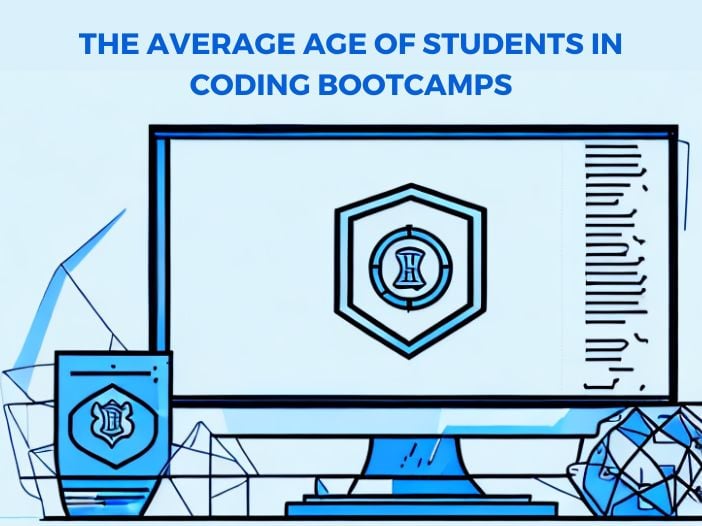For decades, the traditional path to a career in software development involved pursuing a Bachelor’s degree in Computer Science or a related field.
However, as demand for skilled developers has skyrocketed, new options have emerged to train aspiring coders quickly and efficiently.
One such option is coding bootcamps, which are intensive programs that teach coding skills in a condensed timeframe.
One question that often arises is: what is the average age of coding bootcamp attendees?
What are coding bootcamps?
The best coding bootcamps are short-term, immersive programs that teach the skills needed to become a software developer.
They often cover topics such as front-end development, back-end development, databases, cybersecurity, UI/ Ux design, and web design.
Most coding bootcamps are designed to be accessible to those with little to no coding experience, with the goal of helping students launch a new career in tech in months rather than years.
One of the most significant advantages of coding bootcamps is their focus on practical skills.
While traditional education programs may teach theory, coding bootcamps allow students to work on real-world projects that prepare them for the workforce.
Bootcamps also tend to have smaller class sizes, allowing for more personalized attention and instructor feedback.
The average age of coding bootcamp attendees
While data on the average age of coding bootcamp attendees is not readily available, anecdotal evidence suggests that attendees can come from a wide range of age groups.
It’s not uncommon to see recent college graduates attending a bootcamp alongside mid-career professionals or retirees.
Attending a coding bootcamp can be a great way to jumpstart a career in tech or learn new skills to stay competitive in the job market.
Many bootcamps offer intensive programs that can be completed in weeks or months, making them an attractive option for those looking to make a career change quickly.
Age distribution in coding bootcamps
Coding bootcamps may attract a younger demographic due to the perception that programming is a young person’s game.
However, it’s important to note that many people choose to attend a coding bootcamp later in life as a way to switch careers or learn new skills.
One advantage of attending a bootcamp later in life is bringing real-world experience and transferable skills to the program.
For example, someone who has worked in finance may better understand how to apply coding skills to financial analysis. In contrast, someone who has worked in healthcare may have insights into how technology can improve patient care.
Comparing age groups
While age may not be the most important factor in successfully completing a coding bootcamp, it’s worth noting that certain age groups may have advantages or disadvantages when it comes to learning to code.
For example, younger attendees may have an easier time adapting to new technology, while older attendees may have more life experience and transferable skills to bring to the table.
Another factor to consider is the learning style of different age groups.
Younger attendees may be more comfortable with self-directed learning and online resources, while older attendees may prefer a more structured classroom environment with in-person instruction.
How age affects the bootcamp experience
The age of attendees may also impact the bootcamp experience itself.
For example, older attendees may have more responsibilities outside of the bootcamp (such as family obligations or a full-time job), which could impact their ability to immerse themselves in the program entirely.
However, older attendees may also have more life experience that allows them to understand better the real-world applications of the skills they are learning.
Ultimately, the age of coding bootcamp attendees is just one factor to consider when choosing a program.
Finding a bootcamp that aligns with your goals and learning style, regardless of age, is crucial.
Benefits of attending a coding bootcamp at different ages
There are benefits to attending a coding bootcamp at any age. Some potential advantages depending on age include:
Advantages for younger attendees
For younger attendees, attending a coding bootcamp can provide a fast track to a high-paying, in-demand career.
Many bootcamps offer career support and guidance, benefiting those just starting out.
Additionally, younger attendees may have an easier time adapting to new technologies and learning new skills.
Advantages for older attendees
For older attendees, attending a coding bootcamp can provide an opportunity to switch careers or learn new skills.
This can be particularly beneficial for those feeling unfulfilled in their current career or looking for a change.
Additionally, older attendees may have more life experience and transferable skills to help them stand out to potential employers.
Success stories from various age groups
There are countless success stories from people who attended coding bootcamps at different ages.
For example, recent studies show that attending coding bootcamps can significantly increase alums’ earnings by as much as 50%.
Additionally, bootcamp graduates have gone on to work at top tech companies like Google and Facebook.
Factors influencing the average age of coding bootcamp attendees
There are several factors that may influence the average age of coding bootcamp attendees. Some of these include:
Career change motivations
Many people who attend coding bootcamps are seeking to make a career change.
This could be due to feeling unfulfilled in their current job or seeking better job prospects in the tech industry. Career changes can occur at any age, so it’s possible that coding bootcamp attendees come from a variety of age groups.
For example, a 35-year-old marketing professional may attend a coding bootcamp to transition into a career as a web developer. Similarly, a 45-year-old accountant may attend a coding bootcamp to become a software engineer.
Educational background
While traditional education paths to becoming a software developer exist, they can be time-consuming and expensive.
For those without a tech-related degree, coding bootcamps can be a more accessible and affordable option.
This means that coding bootcamp attendees may come from diverse educational backgrounds.
For instance, a 25-year-old college graduate with a degree in English may attend a coding bootcamp to gain the technical skills needed to become a web developer.
Similarly, a 50-year-old who has been working in construction for 30 years may attend a coding bootcamp to transition into a career in software development.
Geographic location
There are coding bootcamps worldwide, and the average age of attendees may vary by location.
In general, coding bootcamps located in larger cities may attract a younger demographic, whereas those in smaller cities or rural areas may attract an older demographic.
For example, a coding bootcamp in San Francisco, California, may attract a younger demographic due to the city’s reputation as a hub for tech startups and innovation.
On the other hand, a coding bootcamp located in a smaller city like Des Moines, Iowa, may attract an older demographic due to the lower cost of living and the opportunity to work remotely.
Regardless of age, attending a coding bootcamp can be a valuable way to gain the skills needed to pursue a tech career.
Types of coding bootcamps
There are many different coding bootcamps, each with its own focus and curriculum.
Some coding bootcamps are designed specifically for beginners, while others are more advanced and geared towards those with some coding experience.
Certain bootcamps focus solely on web development or data science, while others offer a broader curriculum covering various technical topics.
It’s important to research different bootcamps before deciding which one to attend.
Look at their curriculum, read reviews from past students, and consider factors such as location, cost, and job placement rates.
Some bootcamps offer scholarships or financing options to make the program more affordable.
The rise of coding bootcamps
Coding bootcamps have exploded in popularity over the past decade as demand for software developers has skyrocketed.
According to a report by Course Report, there were over 100 bootcamps in the US alone in 2018, up from just a handful in 2012.
The same report also found that over 20,000 students graduated from coding bootcamps in 2018, up from just 2,000 in 2013.
This growth can be attributed to several factors, including the high demand for tech talent, the rising cost of traditional education programs, and the accessibility of coding bootcamps.
Many bootcamps offer flexible schedules and online options, which make it easier for students to balance their education with work or other commitments.
However, it’s important to note that coding bootcamps are not without their criticisms.
Some argue that the programs are too expensive, don’t provide enough depth or breadth of knowledge, and may not be as effective as traditional education programs in preparing students for long-term success in the tech industry.
Despite these criticisms, coding bootcamps remain a popular option for those looking to break into the tech industry.
With their focus on practical skills, personalized attention, and career support, they offer a unique and effective way for students to launch a new career in tech.
Conclusion
The average age of coding bootcamp attendees varies widely, with attendees coming from diverse backgrounds and age groups.
While age may not be the most important factor in successfully completing a bootcamp, there are advantages to attending at different ages.
Ultimately, coding bootcamps provide an accessible and efficient way for individuals to learn new skills and launch a career in tech, regardless of their age.


